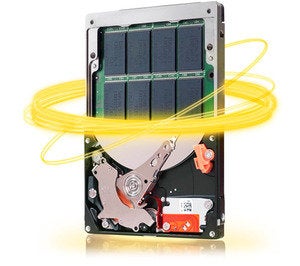When it comes time to buy your next high-performance laptop, chances are good that it will feature a solid state drive (SSD). But what if you'd prefer to have a high-speed, high-capacity traditional hard drive instead? Don't look to Seagate, one of the two 800-pound gorillas in the hard drive industry. The company recently said it will stop making 2.5-inch, 7200-rpm laptop hard drives by the end of 2013.
“High performance in the notebook segment in the future will come from solid-state hybrid drives (SSHDs) rather than drives with higher spin speeds,” a Seagate spokesperson told PCWorld. That comment certainly implies that 7200-rpm notebook drives are on their way out, but the spokesperson initially stopped just short of confirmation.
Both X-bit Labs and AnandTech say Seagate has confirmed it will stop producing 2.5-inch 7200-rpm HDDs. Seagate’s high-performance, notebook-sized hard drives will still be around for some time, however, as the company winds down production and works through its remaining stock.
Seagate does not currently offer a consumer SSD, but those drives are coming. The company signed an agreement with DensBits in 2012 to co-develop both consumer- and enterprise-focused solid state drives.
“Seagate’s roadmap for laptop-class hard drives has long been based on our next-generation, 5400 RPM solid-state hybrid platform,” the company said in a statement toPCWorld after this article was published. “We expect the last 7200 RPM products will ship in mid-summer 2013.”
HDD, the long farewell
As SSD prices have dropped over the past few years, the need for 7200-rpm notebook-sized drives has lessened. When PCWorld reviewed Seagate’s second-generation Momentus XT hybrid drive nearly three years ago, an OCZ 120GB SSD was priced at $400 and the 256GB model was $750. A quick check on Amazon Monday morning shows you can get a 256GB OCZ SSD for $250, less than half what it cost in 2010.
X-bit Labs described the prospects for high-performance HDDs best when it said most people looking for speedy hard drives are already opting for SSDs. Everyone else is generally more concerned about capacity and price, with hard drive performance speed being a secondary concern—if it's even a concern at all. This second class of shoppers may be better served by 5400-rpm hard drives than the slightly pricier 7200-rpm models.
Western Digital, the other behemoth of the hard drive world, hasn't said anything about discontinuing its faster HDDs, but PCWorld has inquired just in case Seagate’s decision is the start of a trend.
And while pure 7200-rpm mechanical hard drives from Seagate may go away, the company will produce solid-state hybrid drives that combine hard drives with a smaller SSD component. These drives typically use the larger hard drive for the bulk of your files and rely on the SSD to increase performance for your most frequently used data. Seagate currently sells 7200-rpm 2.5-inch hybrid drives in 500GB and 750GB capacities under the Momentus XT lineup featuring, respectively, 4GB and 8GB of NAND flash, the key component in SSDs.
The popularity of SSDs in 2013 also shows no signs of stopping. Prices are dropping rapidly, and market research firm IHS iSuppli predicts that SSD shipments in 2013 will more than double compared to 2012 due to the demand for the storage component in Ultrabooks combined with lower prices for NAND flash memory.
Crying out against progress
But are speedier, pure SSDs the best solution for most PC users right now? Some questions remain about the reliability of SSDs compared to HDDs. If you’ve ever fired up a computer that sounds like a VCR, then you already know that when a hard drive starts to go, you can usually hear it. SSDs don’t have any moving parts so when they go it’s often with little or no warning—but they're blazing fast up until then.
And SSDs, while getting cheaper and with larger capacities available, still don’t have the per GB dollar value that hard drives can offer. Amazon currently sells a Crucial 512GB SSD for $350, but you can pick up a 1 TB 7200-rpm 2.5-inch HDD for around $100 to $250 depending on the model.
Then there’s the pain of dealing with a smaller capacity drive if you go with an SSD. You either have to offload most of your files to a bigger external hard drive or put your stuff in the cloud.
Current hassles aside, there’s no question that SSDs are only going to become more popular in the coming years, and Seagate’s decision to dump 7200-rpm notebook hard drives may be an early sign of the coming SSD switch.



